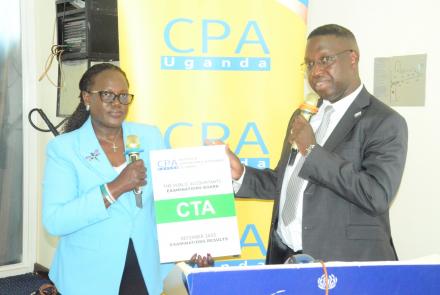By CPA Zuriat Nakayenga
Member of the Taxation and Economic Policy Panel of the Institute of Certified Public Accountants of Uganda (ICPAU).
Tax compliance means the willingness of a taxpayer to abide by the applicable tax laws, file tax returns and pay due taxes within the stipulated time period.
In the Organisation for economic development (OECD) book, building tax culture, compliance and citizenship, it was stated that;-
[1]‘Tax administrations have gradually undergone a transformation from being tax collection agencies to becoming service providers for citizens, positioning themselves as the bridge between the state and the citizens. This reflects the growing awareness that tax collection can also enhance accountability between citizens and the state, in addition to raising the revenue needed to fund essential services.
Finance minister ,Honourable Matia Kasaija, while presenting the national budget for 2025/2026 indicated that about 37.2 trillion out of the total budget of 52.7 trillion was to be collected from domestic revenue i.e tax and non tax revenue, which is over 60% of the budget expenditure. To achieve more than this, therefore, a developing country like Uganda should foster a culture of tax compliance based on rights and responsibilities. Tax administrators should ensure that they engage current and future taxpayers.
Taxpayers who want to be tax compliant should take the following initiatives of voluntary tax compliance, which vary depending on the business and the industry, for instance;
- Documenting and maintaining financial records for taxation compliance procedures.
- Calculating the tax liability accurately and filing necessary tax returns.
- Make the payment within the time limits.
- Conduct internal tax health checks to identify gaps in tax compliance.
- Reply to tax notices and orders. Tax notices and orders are ways to maintain communications between the tax authority and taxpayers. Failure to reply to tax notices within a stipulated timeline may attract legal complications.
Following the COVID-19 pandemic in 2019/20, Uganda experienced a significant reduction in tax collections through self-assessments and voluntary disclosure. To boost tax collection during this difficult time, the government embarked on several strategies like countrywide voluntary disclosure and a waiver of interest and penalties amnesty. Despite that, the country reported underperformance, and 5 years later, this position has not changed significantly. Henceforth, improving and developing a compliance culture in Uganda largely depends on the citizens’ willingness to pay such taxes.
Below is a Deep Dive into What Can be Done to Motivate Voluntary Compliance
Uganda should create a predictable and consistent tax system, issuing technical interpretations promptly and helping taxpayers understand their obligations. Over the years, we have witnessed a wave of relentless and continuous tax amendments with limited time to comply, creating unnecessary tax interest and penalties for even the most compliant taxpayers. It is, therefore, imperative that the government stabilises the tax policy year on year. New tax laws should be properly researched and taxpayers should be given ample time to comply. To harness compliance efforts, support through an enabling political economy, tax policy and structure of the economy is imperative.
There is a Need for Continuous Effort in Taxpayer Education
Uganda has done well in creating awareness. There are several ways that tax collectors reach out to taxpayers, through writing articles, holding seminars, workshops, social media awareness campaigns and presence among others. However, more effort is needed in this space and for future tax compliance. Incorporating tax education into the primary and secondary school curriculum will go a long way in improving awareness and enhancing compliance.
Tax Collectors Should Recognise the Role of Tax Practitioners. Tax practitioners are tax agents and legal practitioners who offer taxpayers a range of services. The role of tax practitioners is important in Uganda’s tax system as they influence tax compliance in the community. Taxation is a complex area and practitioners act as personal advisors to taxpayers. The increasing fear and anxiety among taxpayers leads many taxpayers to rely on a tax consultant.
URA ought to recognise the role of tax practitioners and provide them with a platform that will enhance tax compliance.
Tackling the Informal Sector
Daily Monitor recently published that only 1.7 million taxpayers are registered for taxes but only 1 million taxpayers are actively paying taxes[2]. The low number of taxpayers shows that Uganda still has a long way to go. Uganda still has a narrow tax base because most Ugandans are engaged in the informal sector and the government has not developed efficient ways of collecting taxes from the small and medium taxpayers.
Firstly, all income tax-generating Ugandans must have Tax Identification Numbers and should submit self-assessment returns. Secondly, medium and small business taxpayers’ income tax regimes should be made easier and more efficient. Lastly, all taxpayers who generate income from Uganda should contribute to the national cake. It is quite unfair that the compliant taxpayers are drained the most and yet the biggest number of Ugandans are enjoying tax-free income. Broadening the tax base is a high priority. Most small businesses which operate in the informal sector are not aware of their tax obligations and the potential benefit of being integrated into the formal sector.
Enhancing Compliance through Public Accountability and Transparency
Tax collectors should use the various modes of communication to build taxpayer trust and provide accountability for tax revenue collection and expenditure. Corrupt officials should be brought to book publicly, and compliant taxpayers should be celebrated.
Generating a culture of compliance generally requires a careful examination of motivations to pay taxes, how taxpayers experience and perceive taxation and the related costs and benefits of compliance.





